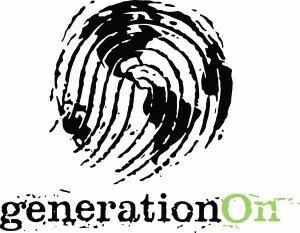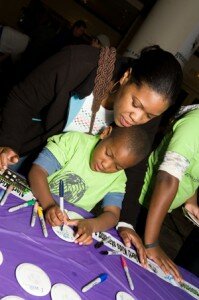- Give yourself plenty of time to plan. Eleven weeks of planning for a large community-wide event with multiple partners is a realistic time-line.
- Gather a team. Who can help with publicity and planning? Who can help organize and recruit a large number of volunteers? Who best knows the community and its needs? Who has a high level of energy, enthusiasm, and really cares about the community? These are the people you want to help you to plan a volunteer event.
- Bring in community partners. Community partners should be a part of the project selection process so they can help to create a sense of community ownership of the project. The more community partners that you involve, the more the community will feel ownership of the project, and the more meaningful the project will be for the community. Group partnerships allow you to reach a larger audience, too.
- Get off to a good start. Make sure your project team has tasks and responsibilities right away. Make certain that the tasks have set deadlines and that the tasks are distributed evenly among the team.
- Think about the size of your project. While you might want a small army of volunteers to create massive change in a community, it might be better to have a small, high quality service project that gets a lot done and is fun for the volunteers rather than a loosely run large-scale project
- Select a meaningful project. A volunteer project ought to have a tangible benefit to the community. Members of the community should see the work as important to how the community functions. The volunteers should learn something at the project, too. Something about the task, the community, or the people that they’re working with.
- Have a contingency plan. It’s important to remember that things might not go as planned on your project day. If you choose a project that’s easily scalable, then you can adjust if too few or too many volunteers show up. Planning a project with tasks for multiple skill levels allows all of the volunteers to do tasks that they’re comfortable with.
- Recruiting Volunteers. There is no sure-fire, guaranteed message that will make someone say yes when you ask them to volunteer, but a well crafted recruitment message helps turn a “why should I care” or a “maybe” into a “sign me up!” Recruit more volunteers than you think you’ll need in case some don’t show up.
- Volunteer Briefing and Debrief. Make sure your volunteers are introduced to the work that they’ll be doing and the impact their work will have on the community. Don’t just tell them what to do and leave it at that. If your volunteers realize that they’re having an impact, they’ll be more likely to come to your next project. Be sure reinforce what kind of impact their work has on the community, both on their day of service and into the future!
What tips do you have for people planning a one day event? Are you planning an event for MLKDay? Have you downloaded our Volunteer Leader Toolbox?

 Amy Lytle is the Executive Director of HandsOn Northwest North Carolina.
Amy Lytle is the Executive Director of HandsOn Northwest North Carolina.

 USA Weekend magazine: Over the past weekend, it recapped this year’s 20th Make A Difference Day, which it co-sponsored with HandsOn Network and Newman’s Own. It mentioned our launch of generationOn that fittingly included service projects and a tribute to extraordinary change-makers at The Extra Mile – Points of Light Volunteer Pathway in D.C. It noted our celebrity participants Madison Pettis and Corbin Bleu, and a nine-year-old volunteer who declared her experience packing toys as the “best day ever!”. It also noted the participation of Obama Cabinet members, including Secretary of Education Arne Duncan, in a KaBOOM! Playground build.
USA Weekend magazine: Over the past weekend, it recapped this year’s 20th Make A Difference Day, which it co-sponsored with HandsOn Network and Newman’s Own. It mentioned our launch of generationOn that fittingly included service projects and a tribute to extraordinary change-makers at The Extra Mile – Points of Light Volunteer Pathway in D.C. It noted our celebrity participants Madison Pettis and Corbin Bleu, and a nine-year-old volunteer who declared her experience packing toys as the “best day ever!”. It also noted the participation of Obama Cabinet members, including Secretary of Education Arne Duncan, in a KaBOOM! Playground build.
 by Alison Rapping, Alison & Associates
by Alison Rapping, Alison & Associates By Marjie Bland, Community Engagement Manager, HandsOn Central Ohio.
By Marjie Bland, Community Engagement Manager, HandsOn Central Ohio. After the movie concluded, we walked a few blocks to the HCZ and had lunch with Ms. Isom. We had many questions for her but first, she explained what the HCZ exactly was.
After the movie concluded, we walked a few blocks to the HCZ and had lunch with Ms. Isom. We had many questions for her but first, she explained what the HCZ exactly was. Suprita Datta is a high school junior currently attending Stuyvesant High School in New York City. She has been volunteering with generationOn for over four years and has been a member of the organization’s Youth Planning Committee, Young Women’s Planning Committee, and Service for School Success program.
Suprita Datta is a high school junior currently attending Stuyvesant High School in New York City. She has been volunteering with generationOn for over four years and has been a member of the organization’s Youth Planning Committee, Young Women’s Planning Committee, and Service for School Success program. Today’s post comes from Gared Jones,
Today’s post comes from Gared Jones,  While this Sunday is officially International Volunteer Day and set apart to recognize the impact of volunteers on their communities around the world, each day for me now seems like International Volunteer Day.
While this Sunday is officially International Volunteer Day and set apart to recognize the impact of volunteers on their communities around the world, each day for me now seems like International Volunteer Day.
